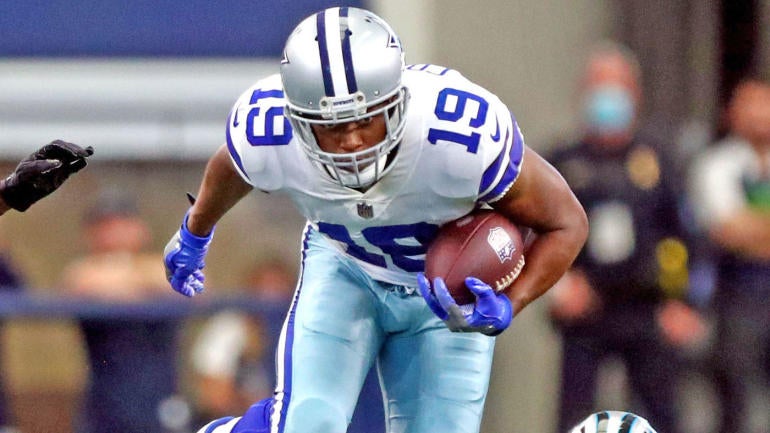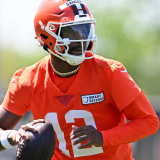
The Dallas Cowboys were able to find a suitor for Amari Cooper after all, trading him to the Cleveland Browns in exchange for a 2022 fifth and sixth-round pick. The Cowboys also sent their own sixth-round pick to the Browns, so Cleveland could take on the remaining three years and $60 million left on his contract.
Dallas sheds $20 million in cap space while Cleveland gets a No. 1 wide receiver after the Odell Beckham debacle. So who won the trade between the two teams? Here are the grades for both the Cowboys and Browns:
Cowboys: D
The Cowboys should get some credit for receiving two draft picks for Cooper, a player they were going to release to save $20 million in salary cap space next week. Even though Dallas was stuck between a rock and a hard place, the Cowboys could have received higher draft compensation for Cooper right?
Cooper is owed $20 million per year over the next three years, a player Dallas once traded a first-round pick to acquire and ignite the offense for a deep playoff run -- which never happened. What's even more perplexing is the Cowboys commitment to Ezekiel Elliott and his $18.22 million salary for 2022, as Dallas can't move on from that six-year, $90 million deal this offseason since they restructured his deal last August to create cap space.
Tony Pollard was the more efficient running back last year and is still on a rookie deal. Dallas has a great running back combination with Elliott and Pollard, yet will have to rely on them more frequently with the loss of Cooper. The Cowboys will still have an excellent passing game with CeeDee Lamb and Michael Gallup (who the Cowboys are in talks of re-signing), along with tight end Dalton Schultz -- but the loss of Cooper will be a hard pill to swallow as he opened up a lot of opportunities for the other pass catchers and elevated Dak Prescott's game since his arrival in 2018.
The Cowboys should be fine without Cooper, but he's too good a player to be traded for two Day 3 picks. Poor contract management by the Cowboys front office made this move necessary.
Browns: A-
The Browns needed to improve at wide receiver, an opportunity they couldn't pass up when Cooper became available. Regardless how Cooper fits in Kevin Stefanski's offense, the Browns only gave up a pair of Day 3 draft picks to improve at the position compared to how their depth chart looked last year.
Taking on Cooper's remaining $60 million contract is worth the risk for Cleveland, especially since Cooper has been a top-10 wide receiver since the Cowboys acquired him in Week 9 of the 2018 season. Cooper has 292 catches for 3,893 yards and 27 touchdowns since he was traded to Dallas, ranking seventh in in catches and ninth in receiving yards and receiving touchdowns in that span.
Cooper, who still hasn't turned 28 yet, is one of six players since the merger with five receiving touchdowns in each of his first seven seasons. The four-time Pro Bowl selection has 7,076 yards before his 28th birthday (which is in June), the ninth-most for any pass catcher in NFL history. Even though Cleveland owes Cooper $20 million per year over the next three years, the Browns can release him at any time and not suffer a dead cap hit (Cooper has no dead money remaining on his deal).
Giving up two Day 3 picks was worth the chance on Cooper, even though the 68 catches for 865 yards in 2021 were the second fewest in his career. There's more target opportunities for Cooper in Cleveland as the No. 1 wide receiver, especially if the Browns allow Jarvis Landry to seek a trade.
The Cooper addition also gives Deshaun Watson some incentive to waive his no-trade clause for Cleveland, one of the teams interested in the Texans quarterback. The Browns didn't give up high draft picks for Cooper, so they still have their draft capital to make a run at Watson.
Cleveland is an estimated $3.1 million over the cap with the Cooper trade, so other roster moves have to be made in the coming days. Hard to believe the Browns are done as they work to revamp their roster.
![[object Object] Logo](https://sportshub.cbsistatic.com/i/2020/04/22/e9ceb731-8b3f-4c60-98fe-090ab66a2997/screen-shot-2020-04-22-at-11-04-56-am.png)


















